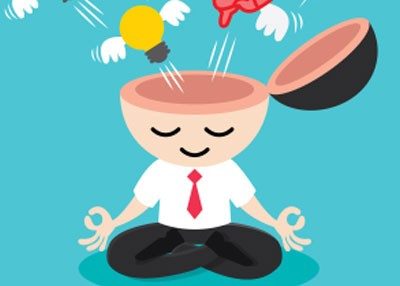Remember when the Japanese were in the news, because their businessmen were so stressed out that they were having heart attacks left and right? Lately, Americans seem to be in the same boat: taking no time for themselves, focusing on their work to the exclusion of all else, and allowing stress to affect their health. Of course, there’s an app for that, but one therapy stands head and shoulders above the rest.
When simple meditation can reverse physical illnesses like high blood pressure, PTSD and even Irritable Bowel Syndrome, then several questions come to mind.How does meditation positively affect physical illnesses? How will I find time to meditate? Does this really work?
Try It
Sometime when you’re sitting and staring out the window, notice the occasion. Are you seeing the traffic moving? Are the trees swaying in the breeze? The birds chirping? Now that you’ve noticed the occasion, notice what you’re thinking.
Are your thoughts focused on something specific, or are you just listening to the chatter in your mind? Are you observing these thoughts from a point outside your head, or are you replying to the conversation? Congratulations, you’ve just practiced mindfulness. This is the conscious attention you pay to different stimuli. It is simple awareness.
The Brain
The brain is a fascinating thing, and it can do twenty things at one time and do them all very well. Let’s examine your brain on mindfulness for a look at how it can affect physical, mental and emotional health. Some of those twenty things the brain does happen in certain areas of the brain:
- Medial Prefrontal Cortex. This is where daydreaming happens
- Anterior Cingulate Cortex. Your attention switches from this region
- The Amygdala. This is where stress forces us to “fight or flight”
- The Hippocampus. This area is important to emotion and memory.
- The Insula. Body sensations are registered here
Stress makes these parts of the brain decrease in size. It affects how these parts communicate with each other as well as how they govern the body’s reactions. For example, studies show that chronic stress alters the pathways between the hippocampus and the amygdale, causing the person anxiety, depression and a profound “fight or flight” reaction. Picture a person with a chip on his shoulder, and an attitude problem you can reach out and touch. This person will likely have not only emotional but learning problems later in life.
Those with a damaged anterior cingulated cortex will be unable to regulate themselves or switch from one subject to another agilely. Their basis for examining any thought patterns will remain in the medial prefrontal cortex, where rambling thoughts live. Picture the person unable to make a decision, unable to handle but one thing at a time.
Mindfulness
There are many ways of exercising the muscle to gain cognitive flexibility such as video games and crossword puzzles (without using a thesaurus). These activities help various parts of the brain gain in size, which positively affects the body. However, when you are suffering from a disease made worse by stress such as high blood pressure, heart disease or anxiety to name a few, it makes sense to alter the brain to deflect stress before it can do its thing. That’s where mindfulness comes in.
Do you remember looking out the window? You were processing the view using the medial prefrontal cortex of your brain. Let’s say that out of the window you saw a car driving too fast hit your new car. The amygdala portion of your brain immediately forces you to your feet, prepared to yell at the driver. The hippocampus registers outrage, while the insula notifies you that your heart is beating too hard for good health.
All portions of your brain are communicating to the others that stress is happening.
Now take a deep breath and close your eyes. Keep breathing deeply to the bottom of your lungs, while you picture your new car as bright and pretty as it was on the showroom floor. Your automobile insurance will pay for the car to be returned to its former glory. The brain will tell the body that everything’s okay now. The heartbeat slows to normal.
You won’t wrap the driver around his own steering wheel. You have just used mindfulness to avert damage to the brain as well as dissecting the stress.
There are tons of great mindfulness exercises as well as ebooks and guidance from trained mindfulness experts to help you on your journey to optimal good health. We’ll be happy to explain it all when you contact us for more information.
Find more exercises related to mindfulness based stress reduction here.
Find more mindfulness exercises related to self-discovery and purpose here.












